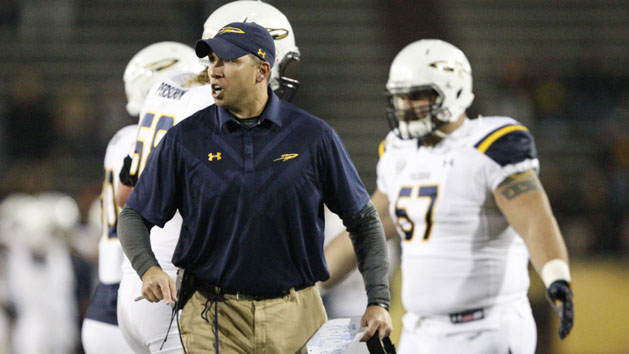
The Mid-American Conference does not have its own network. Its divisions are simply East and West, not like the Big Ten’s Leaders and Legends divisions. For generations, the conference has played second fiddle to its big brother in that region.
In years past, the MAC could beat its chest that it is the cradle of coaches, specifically Miami of Ohio. That program has produced the likes of Weeb Ewbank, Paul Brown, Ara Parseghian and Woody Hayes. Others such as Ohio State’s Urban Meyer (Bowling Green) and Alabama’s Nick Saban (Toledo) began their head coaching careers at a MAC school.
With Kent State, Ohio, Toledo and Northern Illinois leading the way, this has been a banner year for the MAC. The league can certainly look its Big Ten counterpart in the eye for how it has competed overall.
Here are the five reasons why the MAC can brag about its standing in college football compared to the Big Ten this season:
1. Head-to-head record — The Big Ten is 7-3 against MAC teams. Against MAC teams with winning records, however, it is a different story. The Big Ten is 1-2 in this scenario. Iowa’s fourth-quarter rally in an 18-17 win over Northern Illinois (8-1) — after the Hawkeyes trailed by eight — gave the Big Ten its lone victory over a MAC team with a better than .500 record. Indiana lost 41-39 to Ball State (6-3) and Penn State lost 24-14 to Ohio (7-1). The Big Ten’s most impressive win against the MAC was Ohio State’s 56-10 victory over a 4-4 Miami of Ohio team.
2. MAC’s rising coaches vs. Big Ten’s declining coaches — The MAC features a few of the best young up-and-coming coaches in the country who will probably coach a BCS program in the future. The list includes Toledo’s Matt Campbell, 32; Northern Illinois’ Dave Doeren, 40; and Kent State coach Darrell Hazell, 48. There are only a few Big Ten coaches who must feel secure, including Meyer, Northwestern’s Pat Fitzgerald and Bill O’Brien, who will be given time to repair Penn State. Coaches such as Bo Pelini at Nebraska, Bret Bielema at Wisconsin, Kirk Ferentz at Iowa and Mark Dantonio at Michigan State have all endured criticism this season.
3. Allure of potential bowl teams — Big Ten teams will travel better and will get more notoriety from national television viewers than MAC schools. From a competitive and enticing standpoint, however, the MAC offers more. A prime example is the Little Caesars Bowl, which pits the No. 8 Big Ten team vs. the No. 2 MAC team. If the season were over today, that matchup would likely pit a downtrodden Iowa program against an exciting Kent State program that has not gone bowling since 1972. What game would you rather watch: The Meineke Car Care Bowl (No. 6 Big Ten vs. No. 6 Big 12) — perhaps Minnesota vs. Texas — or the Famous Idaho Potato Bowl (WAC No. 1 or 2 vs. MAC No. 3) — potentially Louisiana Tech vs. Toledo? That game would pit two coaches with promising futures — Campbell and Louisiana Tech’s Sonny Dykes — and teams with productive offenses.
4. Big Ten’s questionable scheduling — Although the conferences share the same region — and the MAC craves matchups with larger conferences for exposure — the Big Ten scheduled only 10 games against the MAC this season. The Big Ten played 48 non-conference games overall. That means it played only 20.8 percent of those games against MAC teams. Kent State (7-1), Bowling Green (6-3) and Toledo (8-1) — teams with a combined record of 21-5 — were not scheduled by Big Ten teams this season. They had to go to the SEC (Florida vs. Bowling Green; Kentucky vs. Kent State), Pac-12 (Arizona vs. Toledo), ACC (Virginia Tech vs. Bowling Green) and Big East (Rutgers vs. Kent State; Cincinnati vs. Toledo) to fill their non-conference schedules.
5. No scandals presently with the MAC — Ohio State and Penn State are not eligible for the postseason because of transgressions that occurred during previous coaching staffs. According to research done by FootballGeography.com, Big Ten schools have been sanctioned 23 times for a total of 55 years of probation. The MAC historically has been sanctioned only three times for a total of four years.
